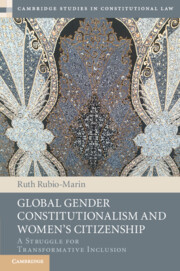Book contents
- Global Gender Constitutionalism and Women’s Citizenship
- Cambridge Studies in Constitutional Law
- Global Gender Constitutionalism and Women’s Citizenship
- Copyright page
- Dedication
- Contents
- Foreword
- Acknowledgments
- Table of Cases
- Introduction
- 1 The Constitutional Establishment of the Gender Order
- 2 Inclusive Constitutionalism and Its Limits
- 3 Participatory Constitutionalism
- 4 Transformative Gender Constitutionalism
- 5 Toward a Constitutional Gender Erasure or a Constitutional Gender Reaffirmation?
- Conclusion
- Index
3 - Participatory Constitutionalism
Women as Norm Creators Broadening the Agenda
Published online by Cambridge University Press: 29 September 2022
- Global Gender Constitutionalism and Women’s Citizenship
- Cambridge Studies in Constitutional Law
- Global Gender Constitutionalism and Women’s Citizenship
- Copyright page
- Dedication
- Contents
- Foreword
- Acknowledgments
- Table of Cases
- Introduction
- 1 The Constitutional Establishment of the Gender Order
- 2 Inclusive Constitutionalism and Its Limits
- 3 Participatory Constitutionalism
- 4 Transformative Gender Constitutionalism
- 5 Toward a Constitutional Gender Erasure or a Constitutional Gender Reaffirmation?
- Conclusion
- Index
Summary
Chapter 3 describes a participatory turn, which, since the 1990s, has demanded women’s equal representation, including through access to constitution-making and, facilitated by the adoption of gender quotas, to decision-making positions. Coinciding in time with movements in favor of participatory forms of constitution-making and in favor of the recognition of the pluralistic and multinational composition of most modern states, this chapter examines the ways in which the participatory turn compelled women across the globe to fight in order to have their voices heard in constitution-making processes, to enshrine new understandings of democracy (such as parity democracy), and to be actively involved as members of their distinctive cultural, religious, or ethnic communities. Under the influence of evolving universal and regional human rights standards, a notion of substantive equality, more focused on actual opportunities to participate, rather than the mere holding of rights, is becoming constitutionally prevalent in many systems, which now compel state powers to go beyond formal equality by proactively addressing the persistent forms of gender discrimination and stereotyping still undermining women´s constitutional status.
Keywords
- Type
- Chapter
- Information
- Global Gender Constitutionalism and Women's CitizenshipA Struggle for Transformative Inclusion, pp. 130 - 210Publisher: Cambridge University PressPrint publication year: 2022

